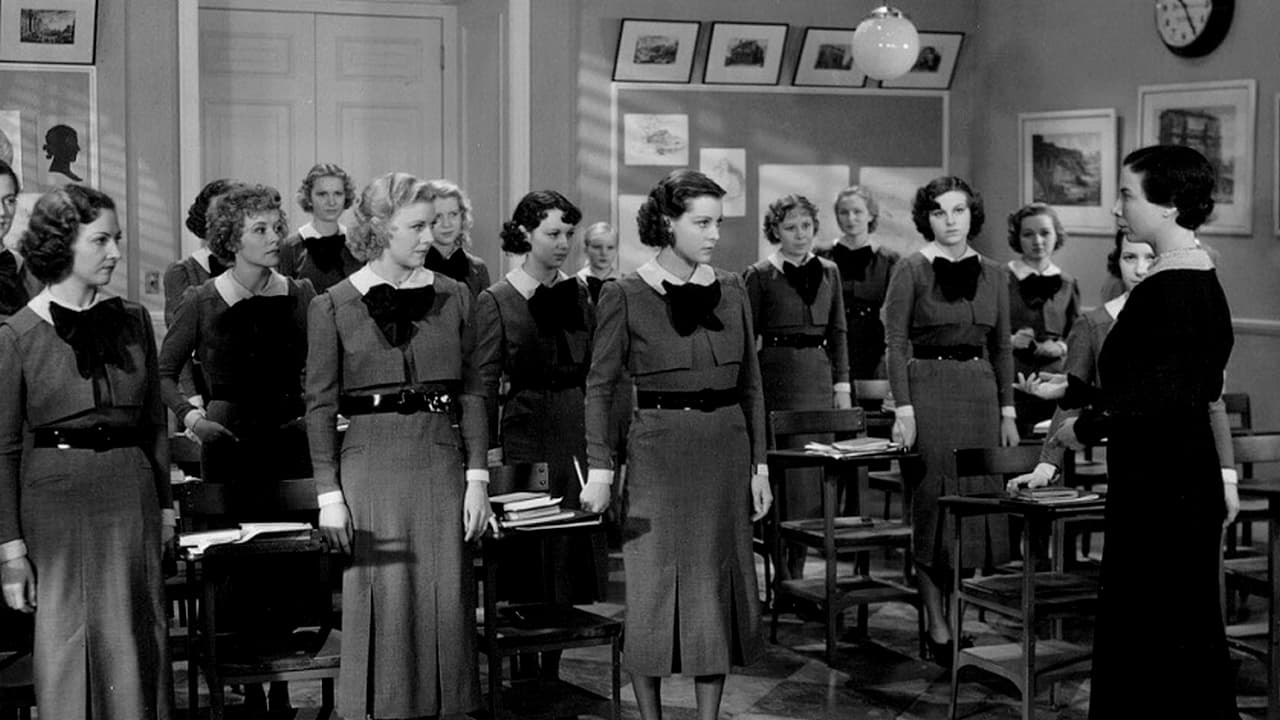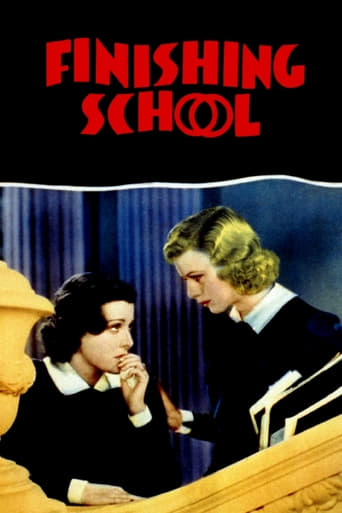

Wonderfully offbeat film!
... View MoreWho payed the critics
... View MoreThe plot isn't so bad, but the pace of storytelling is too slow which makes people bored. Certain moments are so obvious and unnecessary for the main plot. I would've fast-forwarded those moments if it was an online streaming. The ending looks like implying a sequel, not sure if this movie will get one
... View MoreIt's a movie as timely as it is provocative and amazingly, for much of its running time, it is weirdly funny.
... View MoreFrances Dee plays a new student at a private girls school who gets into trouble with snooty headmistress Beulah Bondi for dating intern and part-time waiter Bruce Cabot. Dee's beautiful and likable. Cabot's his usual wooden self but he cracks a smile a few times. Ginger Rogers gets the best lines and steals every scene she's in. Anne Shirley's fun as a younger girl who, in one amusing scene, asks Ginger if she can borrow a bra. Interesting little drama that gets better as it goes along. I didn't expect the pregnancy angle, given that this is 1934. Granted it's tame by today's standards but, still, for the time it was pretty risqué.
... View MoreIf Frances Dee hadn't been so beautiful and opted for marriage with Joel McCrea, her talent would have carried her far (in my opinion). At the end of "Finishing School" she has a scene where she is contemplating suicide and it is very reminiscent of her work in "The Silver Cord" (1933). "Finishing School" was just one of several features made around this time, in imitation of the arty German feature "Madchen in Uniform" (1931). Frances plays Virginia Ratcliff, who is enrolled at Crocket Hall, an exclusive finishing school only for girls with families of breeding and inheritance. Of course she finds life at the school a "double standard", as room-mate Pony (Ginger Rogers) gives her the low down - anything goes but "don't get caught". When Virginia is invited by Pony to a "chaperoned" party and finds it anything but, she is rescued from the drunken embraces of a fresh footballer by Mac (Bruce Cabot), a waiter who is working his way through medical school. Frances Dee reminds one that she could have been a very fine actress. She has several dramatic scenes when she finds herself in the "usual" sticky situation. Bruce Cabot is fine as Mac and surprise! surprise! he doesn't play a jerk but a genuine ah shucks!! kind of guy. Beulah Bondi plays the matron in her usual acidic manner. John Halliday had a thankless role as Virginia's exasperated father. Ginger Roger plays peppy Pony but unlike Dawn O'Day (Ann Shirley) who played Billie, both she and Dee were beyond the proper age to be believable as young debs.An interesting story about Anne Shirley. She was just about to get her big break in "Anne of Green Gables" but before that happened she had to put up with the indignity of her part in "Finishing School". Anne had been in films since she was a baby and ten years later had still not received that "special" part that would push her out of the supporting ranks. Her pushy mother was convinced a role in "Finishing School" was the film to do it. She was given the role of Billie but as always seemed to happen to her, RKO changed it's mind and offered the part to Mitzi Green. So, once again, Anne, a ten year film veteran was shunted aside and given an extra's part while a less experienced player was given her role.... ...but a week later Green left the film, her father didn't think the role was big enough for his daughter (and it wasn't that big) and Anne was re-instated. George Nicholls Jnr, was assistant director and the next movie he was assigned was "Anne of Green Gables". He remembered Anne's work on "Finishing School" and was sure she would be perfect for the role of the red haired orphan - and she was.Highly Recommended.
... View MoreA posh school that makes a big show of its moral codes, and party girl students like Ginger Rogers: there's a genre expectation here of a comedy pitting those two elements against each other - plucky students, goody two shoes students, stuffy teachers, cheeky classroom answers, flashlights under blankets, dormitory windows with trellises or trees to facilitate sneaking in/out. This isn't what the film is, although it plays with those expectations.For a start, it turns out that the institution and the party girls get on fine with each other. Rogers' character sees through the institution's preaching as a front for the "genteel racketeering" of extracting exorbitant fees from rich parents, and she understands that the school doesn't care what she does (or what sort of risks she runs) as long as she's sneaky about it and keeps up appearances.This comfortable arrangement is disturbed by Frances Dee, whose moral code the other characters find hard to categorise because it doesn't seem to forbid any particular behaviour or make a big thing about how moral it is - instead it's something along the lines of being true to oneself and living up to one's commitments.Both the institution and the party girls mistake her initially for a goody-two-shoes, so the institution approves and the party girls like Rogers disapprove. As the film develops, Rogers recognises that Dee's moral code is something to be admired and relied on, and Dee breaks the false dichotomy between a party girl and a goody two shoes by being curious, open minded, and willing to try anything once, but defining her own boundaries and being assertive about maintaining them. This independence soon enough confuses and confounds the school authorities, who crack down aggressively and vindictively on her attempts to find her own happiness.The best thing about the film is Frances Dee, who projects a sense of poise, patience, and decorum that's appropriate to the role (then again, some of the impression of poise and patience is probably accounted for by the fact that she's a timeless beauty who one doesn't feel in any hurry to look away from). The earnestness of her character can be tiring to watch - she's a serious, thoughtful young lady who meets a serious, thoughtful young man, and they have a serious, thoughtful relationship. Perhaps more could have been made of Rogers' character for cheekiness and dancing and comic relief, but that may say more about my own expectations for the film. My surprise at the twist the film took can probably also be attributed to my own expectations of the film and the character - thinking about it in retrospect, it's almost true by definition that serious, thoughtful people who follow their own moral codes are likely to do things that defy one's expectations - it's known as freedom.Because everyone is rich, it's harder to symphatise with their troubles (one wonders what Depression audiences made of being expected to feel sorry for the poor lonely girl who gets a $1000 cheque and a $2500 mink coat for Christmas instead of the company of her vacuous parents), and it requires suspension of disbelief not to expect that whatever trouble they get into, they'll be gotten out of it.Some of the commenters mention some ambiguity in the way the film gets a certain subject past the censors, but it's clear that the filmmakers didn't intend any ambiguity and that an adult audience of the time, familiar with the conventions, wouldn't have had any hesitations or doubts in understanding what was going on.It would be over the top to characterise the film as making any grand statements, but its observations about institutional codes and "genteel racketeering" are quite accurate and apply to more than fictional finishing schools - in a scene that hasn't dated at all, Dee's character is brusquely dismissed from a posh soiree for failing to pretend not to notice that the person she is being introduced to is a family member of a white collar criminal.
... View MoreFINISHING SCHOOL starts with a whimper: FRANCES DEE enters the same finishing school her mother (BILLIE BURKE) attended, a school burdened by rules that most of the girls never follow--including Dee's new roommate, GINGER ROGERS. And it doesn't end with a bang.BEULAH BONDI is the prissy lady who tells Dee about all the rules. ANNE SHIRLEY is a naive girl who wants to be part of the gang but is rebuffed by Ginger's set.The dialog is not exactly crackling with gems. "One step lower and I'll be in the movies," says one old gal who deceives the school mistress by playing the good aunt taking the girls to a matinée instead of a wild week-end rendezvous with men. When Dee passes out on her wild weekend, it's BRUCE CABOT, a waiter at the hotel, to her rescue. He pays a passing milkman 12 cents for a quart of milk so Dee can have some breakfast. Oh, the good old days!! Even with some good names in the supporting cast, it never manages to be more than an innocuous treatment of an innocuous theme. Dee is pretty but her acting, as usual, is pretty forgettable. Bruce Cabot does well enough in one of his few likable roles as a young man studying to be an intern while waiting tables on the side. As for Ginger Rogers, at least she adds a little spice as Dee's friend.Watchable but underwhelming as a feature that probably played the lower half of double bills in the '30s.
... View More